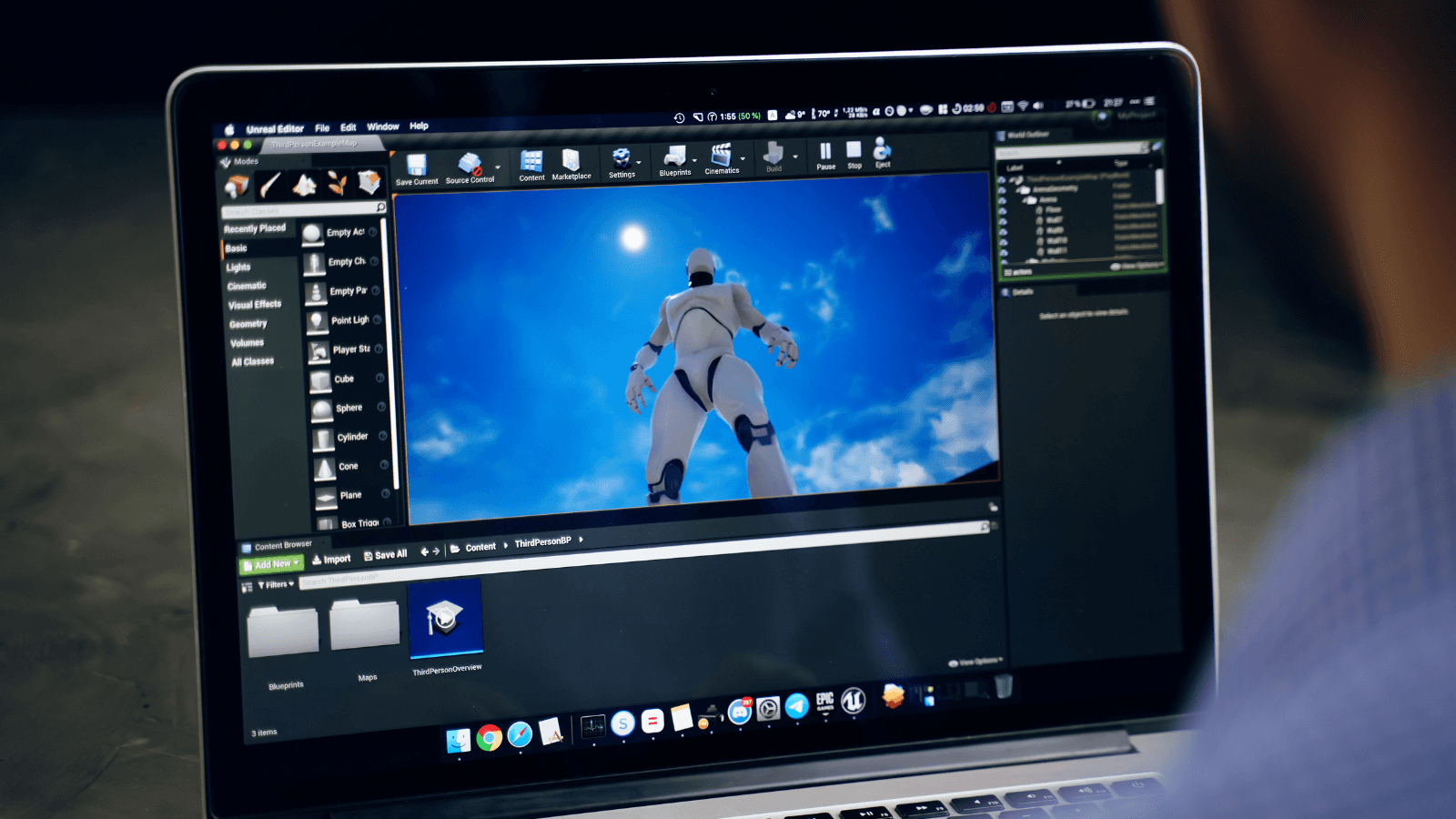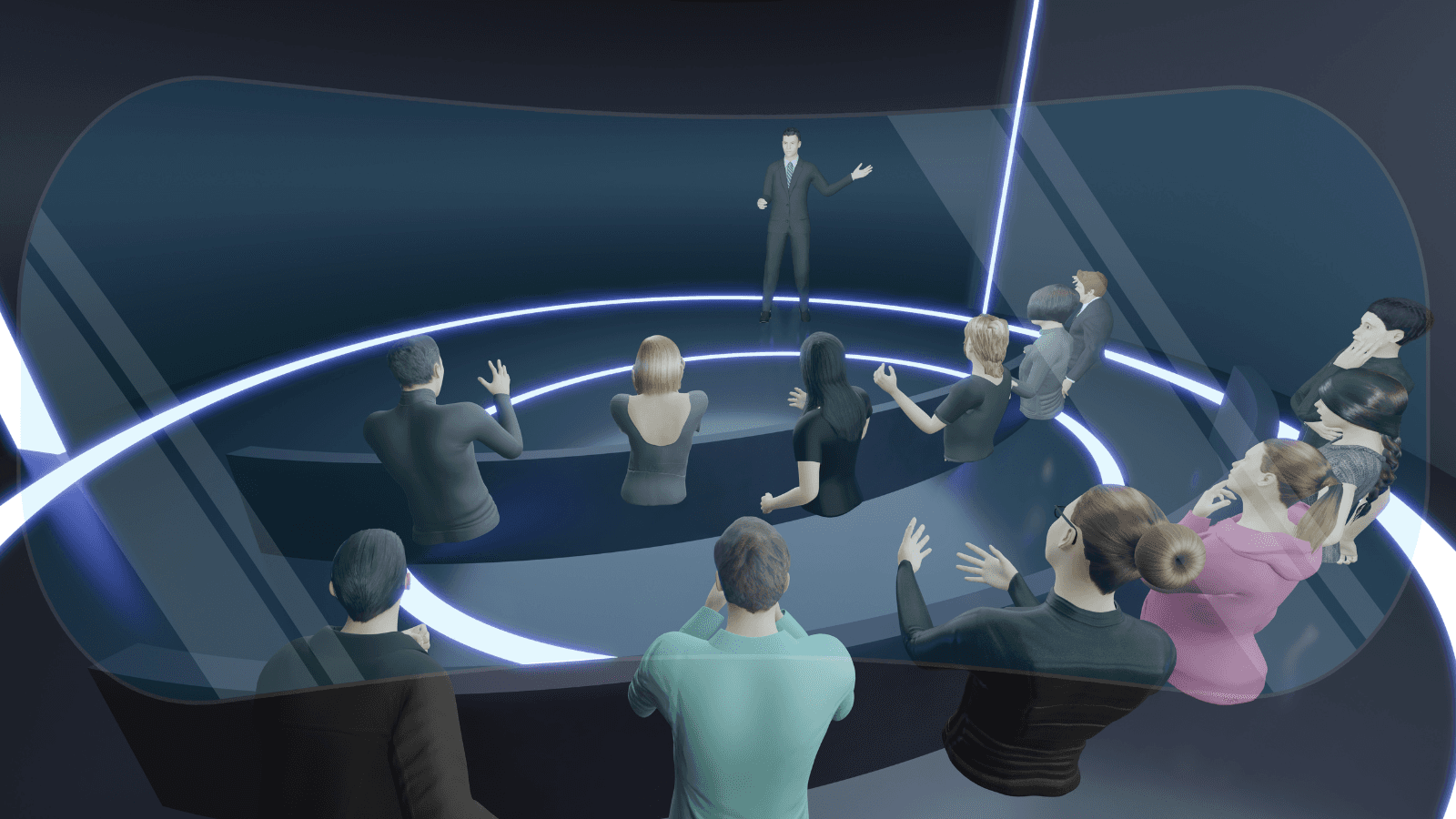Back to Blog
The Metaverse is Transforming Real-World Industries
Sep 26, 2023
Callum Moates
The next iteration of the internet, the metaverse, represents a virtual shared space where users can interact in real time within a computer-generated environment. Over recent years, this concept has grown in popularity, driven by advancements in high-fidelity 3D graphics, virtual reality (VR) and augmented reality (AR). While many initially associated the metaverse with gaming and entertainment, its potential is vast, presenting use cases in industries like real estate and education. Major tech giants are pouring resources into its development, indicating its transformative potential across various sectors.
Real estate
The real estate industry, traditionally reliant on physical presence and tangibility, is undergoing a transformation through the metaverse. This new technology reshapes how properties are showcased, designed, and even sold, offering a blend of virtual and real-world experiences that cater to the evolving demands of modern consumers.
Virtual property tours
Real estate companies are leveraging 3D digital spaces to offer immersive virtual viewings, allowing potential buyers to explore properties from the comfort of their homes. These tours provide a 360-degree perspective, enabling users to navigate rooms and inspect details. This technology offers a more accurate sense of space, layout, and design than traditional photos, making properties more accessible, especially to international buyers or those unable to visit in person. For instance, online real estate platforms like Zillow have integrated 3D tours with their listings through features like ‘Zillow 3D Home’. The 3D tours are combined with the property listings, making it easy for buyers to access and view. And for sellers, listings with 3D tours can stand out in the crowded online marketplace by offering buyers a transparent view of the property and providing them with a competitive edge.
Architecture visualization
Architects and designers can create detailed 3D models of structures and property plans in the metaverse, offering clients a virtual walkthrough of infrastructure even before they are built. Compared to traditional 3D models, these integrate the entire experience of being in the structure, making it immersive and easier to comprehend. These interactive viewings facilitate better communication, allowing clients to provide real-time feedback, request modifications, and understand spatial dynamics more intuitively. For instance, in 2022, Zaha Hadid Architects (ZHA) unveiled 3D renderings of the “cyber-urban” Liberland metaverse open for individuals to visit, which is a virtual city created with futuristic buildings that allow the brand to experiment with new complex designs that could inspire physical structures in the future.
Metaverse-based property sales
The metaverse has led to a new trend of purchasing and selling virtual real estate properties. The 3D internet, where individuals can live, work, and play, is made of digital land parcels that are an investment opportunity. Individuals can acquire real estate in the metaverse, enhancing and building these virtual plots to create spaces for storefronts, events, concerts, and games. For instance, the MetaReal mansion in Miami is both a tangible property and a virtual estate in the metaverse, with the buyer acquiring both the physical home and its non-fungible tokens (NFT) counterpart. Ownership in the metaverse is authenticated using blockchain technology, where NFTs are the digital equivalent of deeds. Platforms like Decentraland, CryptoVoxels, and The Sandbox have become the primary marketplaces for such transactions through the platform’s native cryptocurrency. This market attracts a diverse group, from entrepreneurs and businesses to gamers and everyday individuals, all seeking to capitalize on opportunities like renting, flipping, or hosting events on their virtual plots.

Entertainment
The metaverse’s vibrant environment presents a compelling value proposition for the entertainment industry, presenting new ways to play games, attend concerts, and watch movies.
Gaming
Metaverse–based gaming incorporates 3D technologies, artificial intelligence (AI), blockchain, and augmented and virtual reality (AR and VR), providing gamers with a highly immersive and interactive environment. For instance, games using VR headsets give individuals a realistic experience of being present in a game. A study by Venture Beat also revealed that 52% of U.S. gamers believed the metaverse would change the game industry. The metaverse has also given rise to Web3 gaming that incorporates the ‘play-to–earn’ gaming model, whereby gamers earn rewards as NFTs or cryptocurrencies for participating in the game or completing activities. These rewards can be used, traded, or monetized, blending gaming with real-world economic value. For example, games like ‘Axie Infinity’ allow players to earn and trade NFTs, such as digital pets.
Virtual concerts and performances
Within the 3D internet, artists have the advantage of performing in virtual arenas, bridging geographical divides and connecting with a global fanbase. But the metaverse offers more than just accessibility to events; it promises interactivity on a level traditional concerts can't match. Attendees aren't passive spectators; they can shape the concert's progression, engage directly with their favorite artists, or even share the virtual stage. Beyond the interactivity, the metaverse's virtual domain is a canvas for creativity, enabling artists to immerse their audience in surreal landscapes and dazzling visual effects that transcend the limitations of our physical world.
Renowned artists like Justin Bieber, Travis Scott, and Ariana Grande have graced these virtual stages in the metaverse, drawing millions of viewers from across the globe. Justin Bieber debuted in the virtual realm, performing live as an avatar while also interacting with fans in his unique universe created in collaboration with WaiverCam. Meanwhile, Travis Scott's virtual concert in Fortnite was a spectacle, drawing over 12 million users across countries. The event was marked by dramatic visuals showcasing underwater and space sequences while premiering "The Scotts," his new track with Kid Cudi.
Films
The metaverse concept has also been gaining traction in the tech world and cinema through the increasing integration of VR and AR in filmmaking. The use of 360-degree footage for movies can immerse audiences in the film. As technology advances, movies could also integrate AI-generated characters that viewers can interact with to develop a storyline.

Education
The metaverse is changing how students learn and absorb new concepts. Here are a few ways the metaverse is impacting education and training:
Virtual classrooms: The metaverse's virtual classrooms could redefine the dynamics of remote learning. Unlike traditional online platforms, these classrooms can recreate the experience of a physical learning environment. Students and educators can interact in real-time within a three-dimensional space, fostering a sense of camaraderie and engagement often absent in conventional online courses.
Immersive historical simulations: The metaverse offers a unique opportunity to breathe life into historical events. Instead of reading about ancient civilizations or pivotal moments in history, students can virtually walk through them. Imagine the educational impact of witnessing the Renaissance or exploring ancient Egyptian pyramids. Such immersive experiences can make historical events more tangible and memorable for learners.
Interactive experiments: The metaverse’s virtual space combines gaming, entertainment, and education to create intricate digital, simulated environments where students can easily access learning in streams like STEM disciplines (science, technology, engineering, and mathematics). It allows students to experiment in a virtual space to learn concepts, mirroring real-world conditions without the risks or costs. For instance, students can safely study explosive reactions, like sodium meeting water, using a VR headset in a virtual lab. Alternatively, more complex experiments can be conducted by students leveraging the ability to perform infinite simulations in the metaverse to see how healthy cells function. This digital realm ensures safety and promotes global accessibility and precise reproducibility, marking a transformative shift in education and research.
The metaverse's integration into educational systems offers a plethora of benefits. Its interactive nature can enhance student engagement, potentially improving retention and comprehension. Furthermore, its global accessibility can democratize education, offering unparalleled learning opportunities to students, irrespective of their geographical location. The metaverse also promises personalized education, tailoring learning experiences to individual needs. However, these benefits come with inherent challenges that must be dealt with. The digital divide remains a pressing concern, with not all students accessing the requisite technology. The immersive metaverse might also introduce new distractions, and ensuring the authenticity and accuracy of educational content within this vast virtual realm is paramount.

Conclusion
The metaverse is in its early stages, and its full potential is yet to be realized. As technology advances and more industries integrate with the 3D internet, the boundaries between our physical and digital lives will blur further. The metaverse will not just be a space we visit but a significant part of our daily lives, shaping our interactions, experiences, and how we perceive reality. The future is not just in the metaverse; it is the metaverse.
Are you a brand or organization looking to enhance operations through a presence in the metaverse? We can help build, scale, and monetize your idea within the 3D internet. Get in touch with us!
Sep 26, 2023
Callum Moates
Subscribe to our monthly newsletter
About Landvault
Landvault is building infrastructure to accelerate the metaverse economy, by building tools to create, deploy and monetize content. The company has helped over 200 clients enter the metaverse, including both Fortune 500 companies and government organizations like the Abu Dhabi government, Mastercard, L’Oreal, Red Bull, and Heineken. The company has raised a total of $40m over the past three years and continues to pioneer technological advancements.
